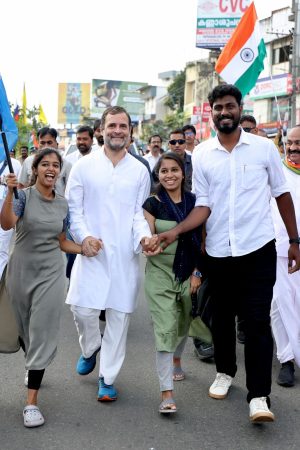Congress leader and former party President Rahul Gandhi set off on an unprecedented 3,570-kilometer-long yatra (march) last week.
Named the “Bharat Jodo Yatra” (Unite India March), the five-month-long march launched by the Congress, India’s main opposition party, will cover 12 states stretching from India’s southern tip of Kanyakumari to Kashmir in the north and is aimed at reviving the party’s sagging fortunes.
The crowds it has attracted have already worried the ruling Bharatiya Janata Party (BJP), which has started not only making personal attacks on Congress leaders but also disparaging its efforts to build support ahead of the 2024 general elections.
Speaking to the media during the march, Gandhi said that the yatra is “an attempt at undoing the damages that have been done by BJP and [its ideological mentor] the RSS by spreading hate in the country.”
In the eight years that the BJP under the leadership of Narendra Modi has been in power and pursued Hindutva politics, India has witnessed increasing communal polarization and suppression of dissent, be it of opposition leaders or critics of the regime. The BJP government has routinely used central agencies such as the Enforcement Directorate and the Central Bureau of Investigation to intimidate and silence opposition voices.
The enthusiastic response that the yatra has evoked so far – young and old people are uninhibitedly interacting with the amiable Gandhi – has put the Congress, which till now was largely written off by the media, back in the news.
The Congress party’s communication in-charge Jairam Ramesh said he was confident that the yatra would “revive” the Congress and be a “lifesaver.” While the decision to hit the streets has indeed recharged party workers and rekindled public interest in the Congress, the march alone is unlikely to change the party’s electoral fortunes.
A stream of leaders have quit the 137-year-old party in the past few months, the latest being the former leader of the opposition in the Upper House of Parliament Ghulam Nabi Azad, a loyalist-turned-rebel. While the exit of several of these leaders reek of opportunism – Azad, for instance, lambasted Gandhi after holding key posts in the party and parliament for decades – the Congress is battling several shortcomings.
A Congress veteran drew attention to the Congress’ leadership crisis. Speaking to The Diplomat on condition of anonymity, the Congress leader said that while “Rahul Gandhi is definitely well-meaning, upright and honest, he lacks political acumen.” He pointed out that Gandhi “comes across as being inflexible and uncompromising – traits that are laudable in social activists but not for a political leader, who is dealing with a cross-section of interests, often in conflict with each other.”
The gradual attrition of the Congress party both in terms of electoral seats and its leaders quitting the party in droves is testimony to this fact.
Gandhi is undoubtedly the face of the march. Yet, he has made it clear he is not willing to lead the party as its president.
After he resigned from the post in 2019, accepting moral responsibility for the party’s defeat in the general elections, his mother and the party’s former President Sonia Gandhi stepped back in.
Rahul Gandhi continues to be the de facto leader as the senior Gandhi is ailing. Interestingly, elections for the post of party president are scheduled to take place in October amid the yatra.
When questioned by the media about his reluctance to contest the polls for party chief, Gandhi said, “My mind is very clear … There will be clarity when the Congress President election takes place. I have made my decisions very clear.”
Rahul Gandhi has been a reluctant leader from the start, describing power as a “poisoned chalice.” Under his leadership, the party has not been able to reverse its losing spree at state assembly elections, leading to murmurs about the prospect of a non-Gandhi helming the party to turn the tide.
As I highlighted in an earlier article a big question is whether, with the Congress being synonymous with the Gandhis, a non-Gandhi would be accepted as party chief?
Congressmen are critical of Gandhi’s unwillingness to look beyond his “trusted” advisors, the majority being from non-political backgrounds. The disconnect between the idealistic moorings of these advisors and the compulsions of electoral politics has left the Congress party floundering.
The power struggle between the Congress’ older generation and younger leaders, marking a generational shift in the party under Rahul Gandhi has intensified. In 2020, a group of 23 senior leaders, the “G-23” wrote an open letter calling for systemic changes in the party. The leadership’s lack of response prompted several of them to quit.
Meanwhile, the Congress “young guns,” Jyotiraditya Scindia, R.P.N. Singh and Jitin Prasada, children of prominent Congress leaders, who were considered close to Gandhi, have now shifted to the BJP in search of greener pastures.
A padyatra (foot march) alone cannot lift the party out of its present crisis. Last year when protesting farmers were mowed down by a vehicle in the convoy of the son of a BJP minister in Lakhimpur Kheri, Gandhi and his sister Priyanka Gandhi Vadra defied restrictions, were beaten by the police and detained. Yet, they persevered in meeting the victim’s family. Despite drumming up tremendous public support at that time, in the Uttar Pradesh assembly elections which followed the Congress was virtually wiped out in the state.
The Congress needs to build on the momentum of the yatra with equally important measures like restructuring of the party organization, balancing experienced leaders with younger ones in key positions and being quick to respond to crises.
The party has to steer clear of activist-like idealism alone especially when it is reduced to having governments in only two states in the country. Congress needs to make winning elections its guiding principle if it is serious in its intent of preventing the BJP from winning a third term in 2024. Noble intentions alone are not sufficient to win elections. The hunger to succeed against all odds counts.

































